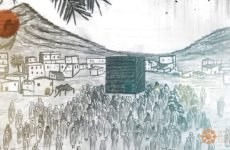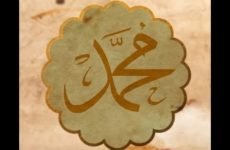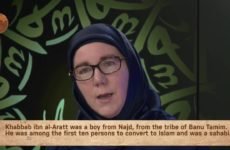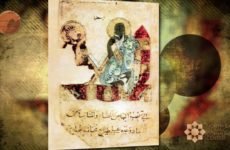Tabligh, the third attribute of prophethood is communication of Islamic truth. Otherwise known as emr-i bil maruf, nehy-i anil munker which means enjoining good and forbidding evil. We say Islamic truth because every prophet came with the same divine religion, ad-diyn, with according to the Quranic description. Based on submission to call and head as his sole mission, the communication of this message.
God chose Muhammad (pbuh) whom He sent as a mercy for all worlds to establish eternally the message of compassion and mercy. If He had not been sent to revive and revise the message of previous prophets, we couldn’t know many complex issues and the real face of divine message and whatever they can rate, however or how they lived. What’s the important parts related to their life or their message? So we couldn’t know on the basis of previous scriptures. So humanity, they are indebted to Prophet Muhammad a lot since he taught us the real face of religion, and real matters related to after life and practice of ibadet and other devotional matters.
Philosophers have always sought answer to such vital questions as
“Who am I?”, “Where do I come from?”, “What’s my final destination?”, “What’s the purpose of life?”, “What does our dying mean?”
and
“Is death absolute non-existence or only a door to a new eternal life?”.
All of us wrestle with such questions and seeking answers. But only through the enlightenment of prophets, we can find true satisfaction and peace of mind.
The Prophet Muhammad (pbuh) dealt with people and life in a holistic manner, appealing to each person’s intellect, reason, spirit and all outer and inner essences and feelings. He never ignored and neglected any human faculties. God directs and guides a prophet as necessary to, so that He can lead his people. As each individual is compromised of intellect, spirit and body, each must be assigned its duty part of the message.
Only when the intellect, spirit and body are harmonized and people are motivated to actively in the illuminated way of divine message, can they become complete and attain true humanity. The Prophet sought this goal,
“Say Muhammad, This is My Way. I called people to God with wisdom and insight. I endorse who follow Me”.
The Prophet was totally dedicated to his mission and thus was an Altruist who lived for the happiness and good of others. His happiness lies in seeing people devote themselves to God in the hope of salvation, not in expecting some grade, reward for his services.
He knows that is reward is with God alone. This indispensable fact is emphasized in the Quran.
“O My People, I ask of you know wealth for it. My reward is from non but God”.
He was charged with conveying the divine message. He did his best patiently, faced many misfortunes and even torment, fulfilled his responsibilities, then left the result to God.
He knew with full certainty that only God brings about the desired result. These three fundamentals set the principles for all those who wish to call others to Islam. Constant striving is an essential feature of delivering the message as well as important element of the prophetic method. The Prophet is, so to speak obsessed with have to perform his duty. With that goal, always uppermost he considers all circumstances and thus everything permitted.
When the Prophet was severely wounded at Uhud. Some companions asked him to invoke God’s curse on the enemy. Instead he prayed for them, saying “Allahummahdi kavmi, feinnehum la ya’lemun” .
“O God, forgive my people because they don’t know”.
He did this while his face was covered with blood. Communicating the divine message was most essential characteristic of God’s messenger. We are worried when we are hungry or thirsty or have troubled breathing. He was worried if a day passed during which he could not convey the divine message to someone. He was so concerned about guidance and so pained by unbelief that God advise him to take care of his health. “O Muhammad (pbuh), it’s maybe that you will kill yourself following after them with grieve that they do not believe in this message.
God’s messenger invited all Meccans, both publicly and privately. He called some extremely stubborn people among them, Abu Jahil, at least fifty times. He particularly sought his uncle Abu Talib conversion for he had raised him and protected him from the Meccan polytheists. In the 11th year of his prophethood, when Abu Talib was dying, God’s messenger again invited him to belief. However the Meccan chiefs surrounded him to prevent this.
He was so grieved at Abu Talib’s unbelief that He said,
“I will ask forgiveness from God for you as long as I’m not forbidden”.
A verse was revealed sometime later forbidding him to do this. In this verse, God said,
“ It’s not fitting for the prophet and those who believe to ask God to forgive polytheists even though they near of kin to them. After it has become clear to them, they are companions of the fire”.
Abu Bakir, the Prophet’s closest companion, knew how much God’s messenger desired his uncle to be believer. He took his aged father who converted on the day of conquest of Mecca to God’s messenger and weep bitterly. When asked why he was sobbing, he explained,
“O God’s messenger, I so wanted my father to be believer. And now he believes. But even more I wanted Abu Talib to believe for you desired it. However God did not grant him belief. This is why I am weeping”.
One of the best examples of the Messenger’s concern for everyone to believe was his invitation to Vahshi who killed his uncle Hamza at Uhud. It was very brutal and Prophet Muhammad, he cried a lot when he saw his uncle and what’s done, all the mutilation done to his body. So he cried a lot. So the person who did, who killed his uncle was Vahshi. But including Vahshi, Prophet Muhammad want everyone to be saved by believing in Islam, accepting him as the Prophet of God.
God’s Messenger sent for him to accept Islam. Vahshi returned the invitation with a letter including the following verse,
“Those who invoke not with God any other deity, nor kill a soul that God has forbidden, accept for just cause, nor commit illegal sexual intercourse, whoever does this shall receive the punishment. Their torment will be doubled on the Day of Judgement and they will abide therein forever in this grace”.
After the verse Vahshi added, you invite me to accept Islam, but I have committed all the sins mentioned therein in this verse. I have lived immerse in unbelief, had illegal sexual intercourse, and in addition killed your uncle who was most beloved by you. Can such a person really be forgiven and become a Muslim?
God’s there upon, God’s messenger sent him a written reply containing the following verse.
“God forgives not that partners should be associated with Him. But he forgives saved that anything else to whom He wills. Whoever associates partners with God has invented a tremendous sin”.
Vahshi returned the letter with the excuse that the forgiveness promised in this verse, dependent on God’s will. Upon this God’s messenger sent him a third letter in which following verse was included.
“Say, O My servants, who have transgressed against their souls, don’t despair the Mercy of God. God forgives all sins. He is the all Forgiving, the Most Compassionate”.
Through this correspondence, God’s Messenger opened Vahshi’s heart to believe and Vahshi could see himself included in the verse mentioned in the last letter. This correspondence enabled Vahshi to repent sincerely and become a companion. Nevertheless, Hamza’s martyrdom had affected God’s Messenger so deeply that He whispered to Vahshi,
“Try not to present yourself to me too often. I might remember Hazma and thus unable to show you the proper affection”.
So here, including Vahshi, how Prophet Muhammad, He’s struggled to save humanity, even a person who killed his uncle in most brutal way. So you can see how Prophet Muhammad dedicated his life to salvation of humanity. Another fine example of God’s messenger’s nobility and altruism, as well as his love for humanity and concern about people’s guidance, is his acceptance of Ikrimah as a companion. Ikrimah was one of the strongest enemies of Islam and the Messenger. And active placement in all plots to defeat him. He fled to Yemen with his wife on the day Mecca was conquered while many of his comarates chose convention to Islam.
His wife Ummu Hakem, convinced him to go to God’s messenger and ask his forgiveness. Despite his previous hostility, Ikrimah was will come by God’s messenger, with the compliment “Welcome o immigrant rider”. After the conquest of Mecca, there was no immigration. We know in Islam, there are three deeds, or actions that remove, that clean person from all kind of sins. One of them is Hicra, immigration. But immigration in specific time of Islam. It was done from Mecca to Madinah after conquest of Mecca. Immigration removed such, it was obligatory upon Muslims. But such obligation is removed. So there was no need to immigrate from Mecca to Madinah.
However the Prophet Muhammad called Ikrimah as immigrant just to warm his heart to Islam. God’s messenger was alluding to Ikrimah’s long journey from Yemen to Madinah. Ikrimah was deeply affected by such nobility and requested him to ask God’s pardon for his sins. When the messenger did so, Ikrimah felt accelerated and promised to spend for the sake of Islam double what he had spent fighting it.
Ikrimah fulfilled his promise at the battle of Yermuk where he was wounded, seeing his wife crying beside him in the tent. He told her,
“Don’t weep, for I won’t die before I witness the victory”.
Sometime later, his uncle Hisham entered and announced Muslims’ victory. Ikrimah asked to be helped to stand up and when they did so, whispered
“O God’s Messenger, have I carried out the promise I gave you?”.
Then he recited,
“make me die as Muslim and join me to the righteous”,
and submitted his soul to God.
This alludes that in the last moment of his life, he saw the Prophet Muhammad (pbuh) in his stand. Maybe Prophet Muhammad helped him, in his last breath, to give his life on the way of, in the path of Allah. So, since he’s struggled, he spent his life, at least the last part of his life, in the way of Allah. God’s messenger will come to him, and helped him in the last moment of his life.
Throughout of his life, God’s messenger grieved for the misfortunes of humanity. He ceaselessly called people to Gods way. During his years in Mecca, he walked the stairs, streets and visited the nearby annual fairs, always hoping to gain a few converts. Insults, derision, torture did not deter him even once. When
“Warn your tribe of the nearest kindred”
was revealed, God’s Messenger invited his relatives to his house. After the meal, he addressed them,
“God has commanded me to warn my nearest relatives. I will not be able to do anything for you in the hereafter unless you proclaim that there is no deity but God”.
At the end of his speech, he asked who would support him. At that time, Ali was a boy with puny legs and arms. When no one responded, he put aside the patur in my hand and declared Ali now he narrates from his mouth. In my hand, I declared I will O Messenger of God. The messenger repeated the call the three times. And each time only he answered him, the Messenger. The preserved, enduring retadness and increasingly harsh derision, degration, beatings, expulsion from the fairs. He was actually stoned by the children in Taif. And important point to note is that while communicating the message, the Prophet set an excellent example of order in guiding people.
The companions did their best to imitate his technique. Another important point is his conduct after the treaty of Hudaibeyah. Some of the companions considered various conditions dishonorable to the Muslims. However in the ensuring, ensuing atmosphere of peace which followed years of disruption and war, many enemies of Islam recognized the message. Eventually, even such leading opened as Khalid and Amr bin Asr accepted Islam.
After the treaty of Hudaibeyah, God’s messenger sent letters to the rulers of nearby countries. He wrote to Negus, king of Abyssinia. The Messenger urged Negus to convert by first greeting him with peace. Since Negus was a Christian, God’s Messenger expressed his belief in the Prophethood of Jesus (pbuh) and affirmed Mary’s virginity and purity. Thus emphasizing the point of agreement between them. Negus received the letter and kissing it, put it to his head as a sign of respect.
Intelligence must be used to reach people on their own level. A prophetic tradition states
“We, the community of Prophets, are commanded to address people according to their level of understanding”.
This point can be illustrated by examples from the life of God’s Messenger. For example, one day a young man appeared, Julaybib, asked God’s messenger to permission to fornicate since he could not restrain himself. Those who were present reacted in various ways. Some scoffed at him, others pulled his robe. And still others dreaded themselves to hit him. But the compassionate Prophet drew him near and engaged him in conversation.
He began by asking him
“Would you let someone do this with your mother?”.
To which the young man replied
“My mother and father be your ransom, O God’s Messenger, I don’t agree with that”.
The Prophet said “Naturally, no one agrees that his mother should be a party in such disgraceful act. He then continued asking Julaybib the same question but substituting daughter, wife, sister, and aunt for mother. Everytime Julaybib replied that he would not agree to such an act. By the end of this conversation, Julaybib had lost all desire to fornicate. But God’s Messenger concluded this spiritual operation with a supplication. Placing his hand on Julaybib’s chest, he prayed
“O God, forgive him, purify his heart, and maintain his chestity”.
Julaybib became a model of chastity. Sometime later he married through the intermediation of God’s Messenger. Not long after that, he was martyred in a battle and when his corps was located, God’s Messenger put his hand on his knee and said
“This one is of me and I am of him”.
Those who want their words to influence people must practice what they preach.
God’s Messenger was the living embodiment of his mission. He was the foremost in practicing Islam, devotion to God and servanthood to Him. It was not uncommon for those who saw him to require no other proof to believe in his Prophethood. For example, Abdullah ibn-i Selam, the renowned Jewish scholar of Madinah believed in him at first sight saying
“There can be no lie in this face. One with such a face can only be a Messenger of God”.
One reason why Prophet Muhammad (pbuh) is still loved deeply by hundreds of millions of people, regardless of unending hostile and negative propaganda and why people all over the world embrace Islam daily is that he practiced what he preached.
For example, invited people to worship God sincerely, and is himself the best example of such worship. He would spend more than half of the night in prayer crying and full of humility. His life was so simple that once Umar upon seeing him said
“O Messenger of God, kings sleep in soft, feather beds while you lie on a rough mat. You are the Messenger of God and thereby deserve an easy life more than anyone else”.
God’s Messenger answered
“Don’t you agree that the world should be theirs and those of the hereafter ours?”.
God’s Messenger, like all other Prophets, expected no reward for performing his mission. He suffered hunger, thirst, and every other hardship, he was forced into exile, and made the target of assaults and traps. He bore all of these simply for the good pleasure of God and the good of humanity.
Abu Hurairah once saw him praying while seated and he asked if he was sick. Thereupon the Messenger replied
“I am hungry Abu Hurairah”.
Thereupon Abu Hurairah cried. Because hunger has left to stand up for prayer in God’s Messenger. Thereupon Abu Hurairah cried. This time the Prophet said
“Don’t cry because the severeness of punishment in Judgement Day will not touch for those people who suffer hungerness in this world”
























